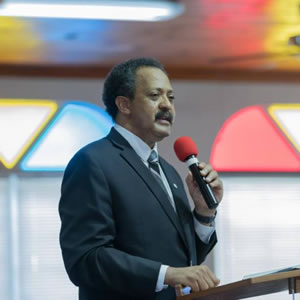On March 22 to 23, 2019, Sabbath School officials from every level of the world church convened in St. Croix, United States Virgin Islands (USVI) with one goal: to instruct the church in reclaiming and discipling former members. Dr. Henry Peters, Sabbath School Director of the local North Caribbean Conference (NCC), welcomed those assembled to this “historic journey.”

The statistics are staggering. Professor Felix Vidal Pavon, the Sabbath School Director of the Inter-Oceanic Mexican Union, noted that in 2000 in the world church, for every 100 members who came in, 46 would leave. That number was worse in 2016 when 49 out of 100 members left. In Professor Pavon’s own union in Mexico, the statistics are even more alarming. In 2015, seven out of every 10 members who came in had disappeared. And since 2016? In the Inter-American Division (IAD) alone, from 2016 to 2018, the church lost 153 thousand believers!
This Reconciliation Congress, therefore, addressed two basic questions: why are members leaving, and what can the church do to reverse this tragic loss?
In informative and soul-searching presentations, Sabbath School Directors from the local union to the General Conference (GC) led the combined congregations from St. Croix, USVI, to recognize the problem, study Jesus’ method for dealing with it and then learn practical methods for reversing this member loss.

Pastor Samuel Telemaque, IAD Sabbath School Director, noted that each Sabbath School class has a group of former members. It is this group which members are challenged to reclaim. The Sabbath School, said Pastor Telemaque, must realize that reclaiming members is a “divine call.” Those called must be willing to have intercessory prayer sessions for these former members, and must be ready to listen to the hurt they express. Those called must also be trained in what to say, how to pray and how to empathize. They must be willing to acknowledge that members have been hurt and must apologize, but never argue. Pastor Telemaque encouraged churches to study and use the Biblical method of reclaiming and discipling (2.Corinthians 5: 18-19 and Ezekiel 34).
As the other speakers elaborated on the theme of reclaiming and discipling, Professor Moises Prieto, Sabbath School Director of the South Columbia Union, asked the audience, “How many left your church last year?” Discussing the member loss, Professor Prieto suggested that the work of the pastor needs to be redefined. Too many pastors are simply baptizing but not discipling the new members. Dr. Henry Peters, the NCC host for the Congress, added that Sabbath School is all about discipling members. “People who leave the Adventist Church are people who first drop out of Sabbath School,” Dr. Peters pointed out.
In the Divine Service on March 23, 2019, Dr. Ramon Canals, the Sabbath School Director of the GC addressed an overflowing congregation of believers from the eight churches on St. Croix. In his insightful presentation dotted with humor, he suggested that Satan often uses religious people to block others from going to church. But he urged members to be steadfast. “Don’t let anyone kick you out of the church,” Dr. Canals advised. “If they kick you out of the front door, come back in through the back door. If they kick you out of the back door, come in through a window.”
As the guests and lecturers concluded the Congress on Sabbath afternoon at the Peter’s Rest Church, Dr. Canals acknowledged that conflict is inevitable in church as in life, but he suggested, “Don’t let conflict steal your zeal.” Since one out of four persons who leave the church does so because of conflict, members were urged to follow Daniel’s example of dealing with conflict: speak with wisdom and tact, request time (to pray), ask questions, ask friends for help, define the problem, focus on the main thing, respect the other person, and focus on the situation rather than the problem.
Finally, is there a way to prevent conflict? Dr. Canals suggested that friendship seems to be “the element cementing new converts and members to their congregations.” Members were encouraged to pray to be clothed with compassion. “People just want to be loved,” Dr. Canals reminded the audience.
Sis.Nancy Graham, one member of the much-loved Lansiquot Sisters singing group, thought that the weekend was “an inspiration and a motivation.” It not only showed the Sabbath School members what to say to the missing members, but how to say it. She found this approach practical.
Professor Felix Pavon, one of the presenters, noted, “It is time. It is now the moment in which members of the church have to be [serious] about the implications of going to look for the former members with the same attitude which God would have.”
Sis.Debra Phillips, Director of the Caribbean Union Sabbath School Department, considered the presentations Spirit-filled, informative, and enlightening. She believes that the Congress met its objectives of identifying the need and the strategies for reclaiming and discipling missing members.
Dr. Peters and Pastor Telemaque, the NCC and IAD hosts of the Congress respectively were happy that the weekend activities were well-supported and that those attending had positive responses. These hosts also commented that the weekend was “a historic event” and a “Kodak moment” as leaders of the Sabbath School from the local church, the local Conference, the Union, the Inter-American Division, and the General Conference stood on the platform of Central Church, shoulder to shoulder in a show of unity, for this long-overlooked purpose: to reclaim and disciple former members.

